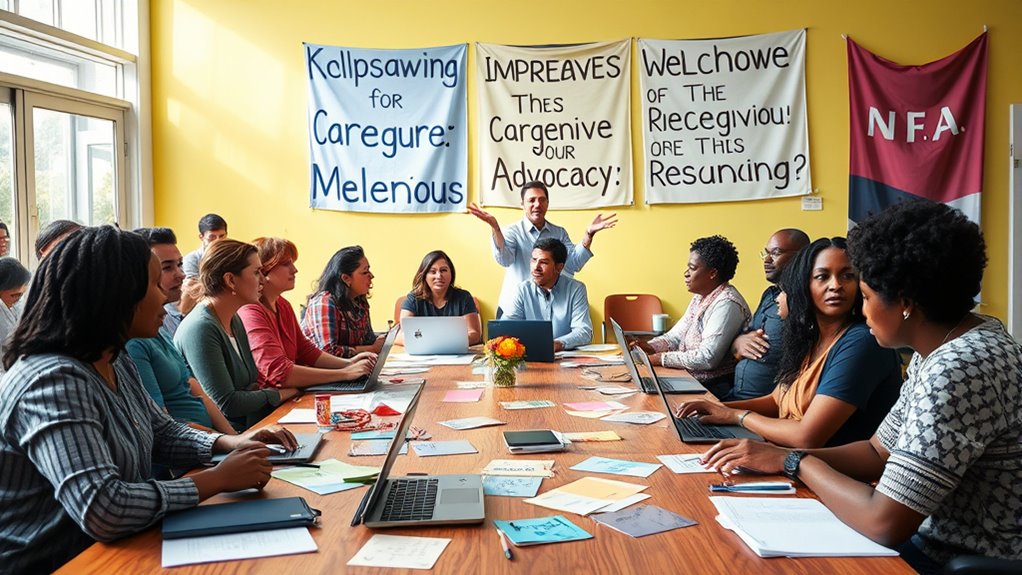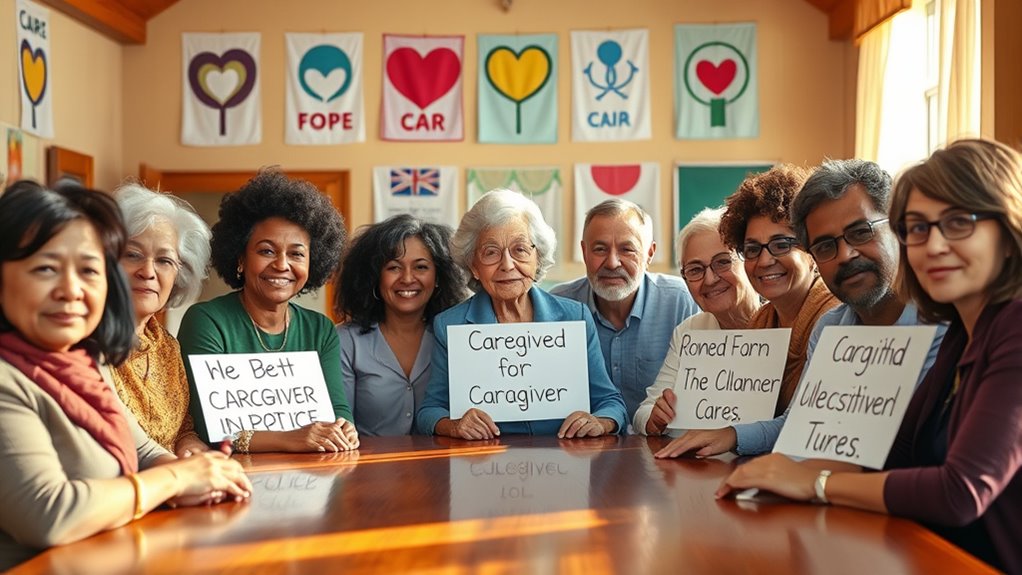Advocating for better caregiver policies means actively engaging with community groups, policymakers, and healthcare organizations to highlight your needs. Support networks, coalitions, and public campaigns can amplify your voice and drive change. Focus on raising awareness about overlooked challenges, push for policy reforms that include legal protections, financial assistance, and resources. Staying informed and involved guarantees your concerns are heard. Keep exploring further to discover practical strategies and inspiring success stories that can help you create meaningful impact.
Key Takeaways
- Engage community organizations and coalitions to amplify caregiver voices and advocate for policy changes.
- Participate in public forums, town halls, and hearings to raise awareness and influence legislation.
- Collaborate with healthcare and social service providers to push for systemic policy reforms supporting caregivers.
- Leverage advocacy tools like targeted messaging, thank you letters, and legislative reviews to promote policy improvements.
- Promote awareness of caregiver needs through community campaigns, creative outlets, and cultural understanding initiatives.
Understanding the Critical Role of Caregivers in the Healthcare System

Caregivers play an essential role in the healthcare system, often providing the majority of support for loved ones with health or aging-related needs. As a caregiver, you contribute considerably through unpaid support, helping with daily tasks, medical management, and emotional care.
Caregivers are vital, offering unpaid support in daily tasks, medical care, and emotional support.
Despite this crucial role, the healthcare system often overlooks your needs, offering limited policy focus on caregiver support. Many caregivers lack proper training, which can impact both their effectiveness and well-being. Advance directives can further empower caregivers by providing clear guidance on medical decisions. Additionally, in various regions, cultural practices and local customs can influence how caregiving is perceived and supported, highlighting the need for tailored policies to address these unique challenges. Community support can also play a vital role in alleviating some of the burdens caregivers face.
Furthermore, financial assistance remains scarce, adding stress and hardship. The caregiving impact extends beyond your loved one, affecting your health, employment, and mental well-being. Higher contrast ratios yield deeper blacks and brighter whites, enhancing the overall quality of care and support you provide.
Recognizing your critical contribution is essential for advocating better policies that support training, financial aid, and systemic recognition of caregivers’ indispensable role in healthcare.
Key Policy Areas Impacting Family Caregivers

Policy decisions substantially shape the support available to family caregivers, yet many critical areas remain underfunded and overlooked. You need better policy support that recognizes your essential role in health and home health services.
Current healthcare policies often focus on patients but neglect family caregivers, leaving many without adequate recognition or resources. Financial assistance, such as tax credits and programs like Medicaid’s Cash and Counseling, can help ease your economic burden, but funding remains limited. Additionally, many caregivers could benefit from self-watering planters that reduce the effort of maintaining plant care, providing a soothing environment at home. Implementing policies that align with diversification strategy can enhance the stability and well-being of caregivers. Moreover, increased awareness of Borderline Personality Disorder can help caregivers better understand the challenges faced by their loved ones and improve their own emotional resilience. Additionally, understanding assisted living expenses can inform caregivers about financial options available for their loved ones’ long-term care.
Legislative advocacy is fundamental to expand caregiver recognition, improve access to paid care, and include family caregivers in medical records and decision-making processes. Strengthening policies in these key areas ensures you receive the support necessary to provide quality care without sacrificing your well-being. Additionally, understanding the importance of emotional depth in caregiving can enhance the quality of support you offer to your loved ones.
Strategies for Effective Advocacy and Policymaker Engagement

Effective advocacy begins with building strong relationships with your policymakers. To influence caregiver support legislation, you need to engage them effectively. Here are three key strategies:
- Personalize your approach by sharing caregiving stories and understanding their backgrounds to foster trust. Additionally, a high Cultural Intelligence (CQ) correlates with improved communication and collaboration, which can strengthen your advocacy efforts. Incorporating user-friendly systems into caregiver training can also enhance their effectiveness. Emphasizing the importance of cultural breakfast traditions can also help illustrate the diverse needs of caregivers from different backgrounds. Hosting events like internal company hackathons can also provide a platform for innovative ideas that support caregivers.
- Utilize advocacy tools like thank you letters, targeted messages, and legislative bill reviews to reinforce your message.
- Participate actively in community events, town halls, and hearings to raise awareness directly with elected officials. Additionally, consider leveraging community engagement strategies to enhance your advocacy efforts and foster greater support for caregiver policies.
Building Community Support and Coalition Partnerships

Building community support is a powerful way to strengthen your advocacy efforts. Engaging local organizations, faith groups, and coalitions amplifies caregiver voices and drives policy change. When you unite diverse stakeholders, your advocacy becomes more effective—mobilizing resources, increasing public awareness, and creating a united front for caregiver support. Partnering with healthcare providers and social service agencies further solidifies your efforts, helping to shape policies that recognize caregiver needs. Forming coalitions enables shared resources, coordinated outreach, and consistent messaging, all essential for influencing legislative priorities. Additionally, unique planter designs can offer caregivers a creative outlet for relaxation and mindfulness, enhancing their overall well-being. Consider this example:
| Approach | Impact |
|---|---|
| Building local coalitions | Increased community engagement and advocacy power |
| Partnering with stakeholders | Strengthened policy influence and resource sharing |
| Running community campaigns | Enhanced public awareness and support |
Additionally, personalized items such as engraved keychains can serve as thoughtful reminders of the importance of caregiver support. Regularly practicing mindfulness techniques can also help caregivers maintain their focus and emotional stability amidst their responsibilities.
Resources and Organizations Supporting Caregiver Advocacy

Numerous organizations dedicate themselves to supporting caregiver advocacy by providing essential resources and services. These advocacy organizations play a crucial role in strengthening caregiver support, influencing policy change, and expanding support networks. They offer caregiver resources, such as educational materials, legal assistance, and community connections, enabling you to navigate family care more effectively. Additionally, many organizations focus on fostering a digital-friendly environment at home, which can enhance the caregiving experience. The need for robust contingency plans is vital for caregivers to manage unexpected challenges.
Numerous organizations support caregivers through resources, policy advocacy, and community networks.
- Access to tailored caregiver resources that address your unique challenges and spiritual guidance for emotional support. Support networks can also provide information about safe foods for pets, like apples and pears, which can be helpful for caregivers with dogs.
- Engagement with advocacy organizations that push for public policy reforms benefiting caregivers.
- Participation in support networks that foster shared experiences and collective action. Additionally, many organizations can connect you with free legal assistance to help navigate caregiver-related legal issues.
Frequently Asked Questions
How Do I Advocate for Policy Change in Healthcare?
To advocate for policy change in healthcare, start by understanding current policies and pinpointing areas needing improvement.
Reach out to your elected officials through calls, letters, or meetings, sharing your personal experiences to make your case compelling.
Use resources from organizations like NCOA or Families USA to strengthen your message.
Attend public hearings and join advocacy groups to amplify your voice and press for meaningful reforms that benefit everyone.
How to Advocate for Caregivers?
They say, “A rising tide lifts all boats,” so advocating for caregivers benefits everyone. You can start by sharing personal stories to highlight their struggles and needs.
Then partner with organizations like AARP for resources. Schedule meetings with legislators, participate in hearings, and run social media campaigns to raise awareness.
Pushing for policies like paid leave, tax credits, and workplace support shows caregivers they’re valued and essential to our communities.
How Do You Advocate for Policies?
To advocate for policies, you start by researching relevant legislation and understanding its impact.
Then, craft clear messages with personal stories and specific policy asks.
Engage with elected officials through calls, emails, or visits, and participate in public hearings or advocacy events.
Build relationships with lawmakers and organizations to strengthen your influence, and stay persistent in pushing for the changes you believe are necessary.
What Are Some Examples of Things People and Organizations Can Do to Support Caregivers?
Think of supporting caregivers as planting seeds in a garden. You can organize or join campaigns to nurture these seeds, sharing stories that inspire growth.
Volunteering with organizations is like watering the plants, and educating employers is providing sunlight.
Writing to officials and raising awareness acts as tending the garden, helping caregivers flourish with the resources and recognition they deserve.
Your actions can help build a thriving, supportive community for all caregivers.
Conclusion
Now that you understand the essential role caregivers play, it’s time to take action. Your voice can shape policies that provide fair support, resources, and recognition. Imagine a future where caregivers are truly valued and empowered—can you see the positive change your advocacy can bring? Every effort counts, and together, we can create a healthcare system that cares for those who give so much. Will you join the movement to make that vision a reality?









